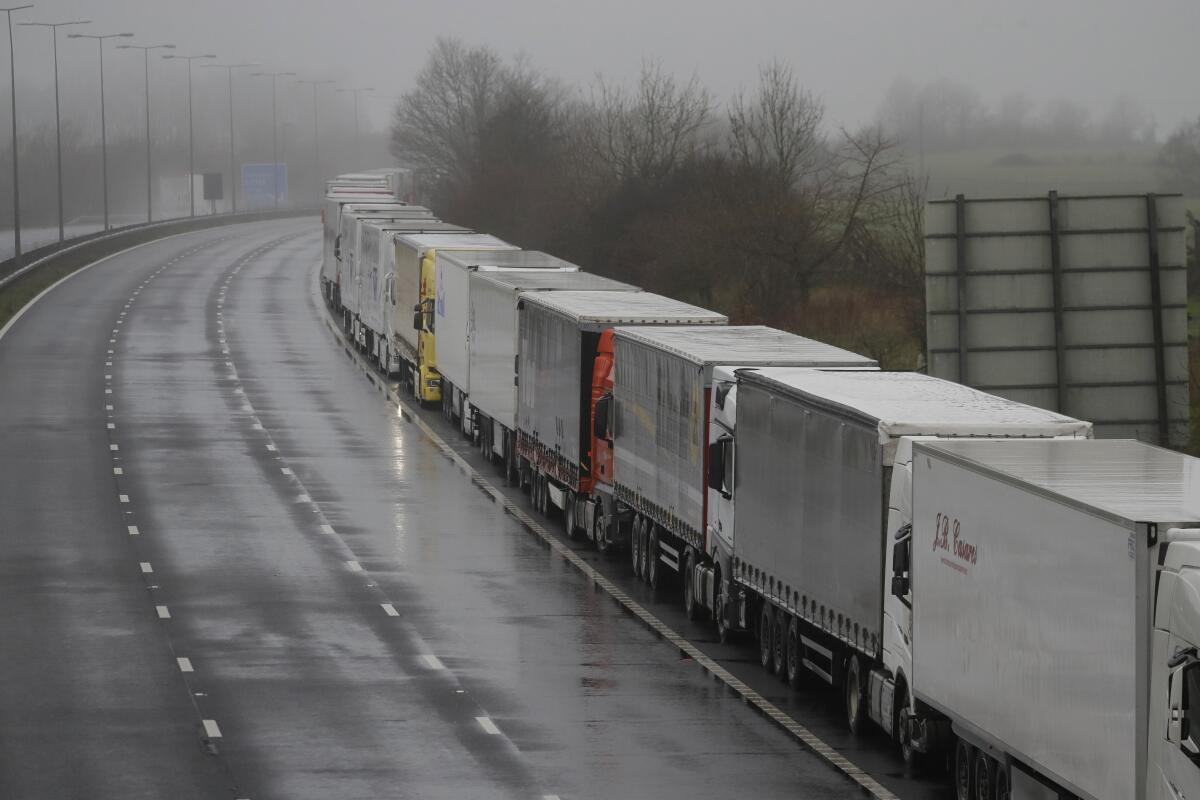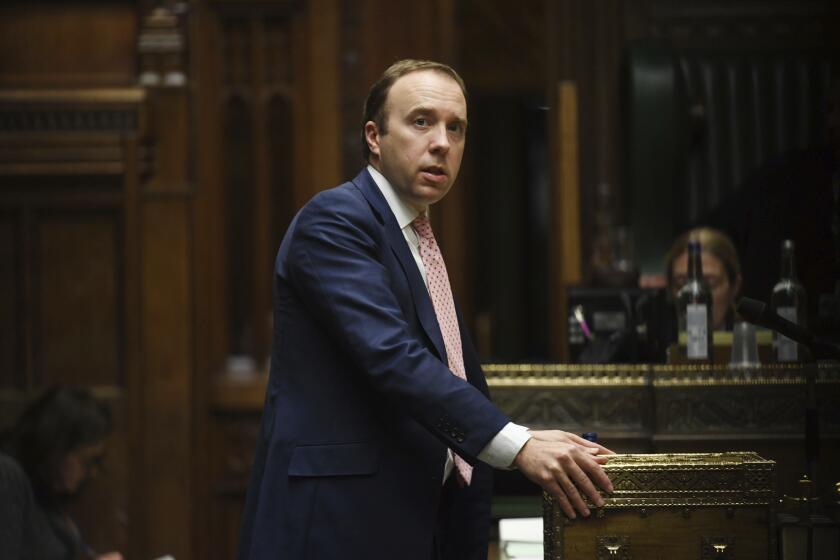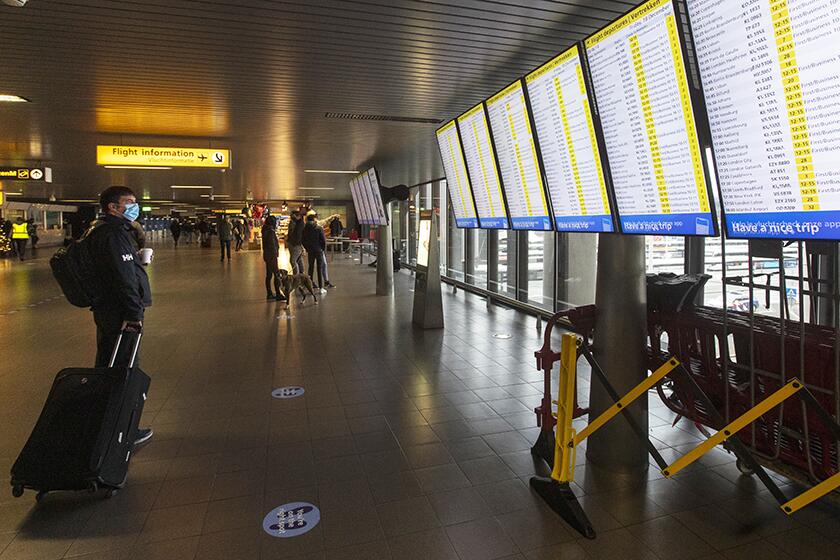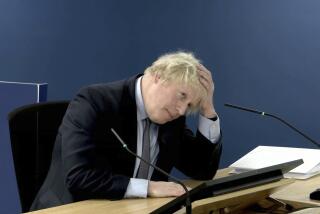A new strain of coronavirus and looming Brexit chaos make the Yuletide gray in Britain

- Share via
LONDON — The coronavirus and the outside world are delivering a joint holiday message to Britain: Have yourself a very little Christmas.
With a new and more contagious strain of COVID-19 sweeping rapidly across the southeast of England — home to the capital, London — Britain on Monday effectively became an international pariah, cut off from much of the rest of the world as a lengthening list of countries barred their doors.
Dozens of flights leaving Britain were grounded, ports were closed and operation of the Eurotunnel between Britain and France was suspended for 48 hours, leaving travelers stranded and cargo-laden trucks stopped in their tracks at what typically would be one of the year’s busiest times.
The chaos added to the devastating impact that the coronavirus has already had on Britain, where COVID-19 has claimed more than 67,000 lives — the second-highest death toll in Europe, after Italy — and crippled the economy.
On top of that, Prime Minister Boris Johnson’s beleaguered government is now confronting the very real prospect of a no-deal Brexit — a final divorce from the European Union without a trade deal — on Dec. 31, which could scar the United Kingdom’s economy for years.
“It’s a shambles,” said Quentin Peel of the Europe program at the international affairs think tank Chatham House.
British scientists have found a version of the coronavirus with a cluster of genetic changes that make it more transmissible and perhaps more dangerous.
The new variant of the coronavirus attacking Britain is not believed to be more lethal or more resistant to vaccines, but officials say it is up to 70% more transmissible. The prospect of uncontrolled contagion forced Johnson to inform the country that he was, in essence, canceling Christmas for many in England, ordering millions to forgo holiday travel and gatherings.
The government had previously said up to three households would be permitted to mingle indoors, exclusively, over a five-day period. But Saturday, Johnson glumly declared that people in London and the rest of England’s southeast must not mix at all with other households, suddenly upending plans that had been weeks in the making. Elsewhere in Britain, a maximum of two households can meet on Christmas Day only.
Only days earlier, Britain’s tousle-haired premier had stood before Parliament and mockingly likened opposition leader Keir Starmer, who had repeatedly urged Johnson to maintain coronavirus restrictions at Christmas, to the Grinch. Now here was Johnson doing just that.
Longtime Johnson watchers saw a familiar pattern. The prime minister, Peel said, hates making unpopular decisions, “so he desperately puts this off and looks indecisive.” Then a final flip-flop ends up making everyone even angrier.
Canada joins France, Germany, Italy and other European nations in banning travelers from Britain out of fears over a new strain of coronavirus.
Public confidence in Johnson’s handling of the pandemic has plummeted in recent months, as the government has repeatedly overpromised and underdelivered.
First came widespread shortages of personal protective equipment for frontline health workers. Then what was touted as a world-class app for tracking and tracing coronavirus cases failed to materialize. The country’s testing system has also been in disarray.
“The challenge for the government is that they are no longer able to control events — events are controlling them,” said Tony Travers, associate dean of the London School of Economics’ school of public policy. “Once that happens, all government becomes is reactive.”
Restaurants and pubs are closed across most of Britain, and other sectors have been left reeling from the various degrees of coronavirus lockdown that various parts of the country have been under since March. If Britain also fails to reach an agreement with the European Union on a post-Brexit trade deal — which would result in overnight tariffs on many British goods entering the EU, the U.K.’s biggest trading partner — even deeper and longer-lasting damage to the British economy looms.
“It clearly risks making a difficult situation worse,” Travers said.
The sudden closure of many countries to British travelers because of the coronavirus mutation and the threat of a chaotic exit from the world’s biggest trading bloc triggered urgent but separate meetings by EU leaders as well as Johnson’s top advisors Monday.
British retailers sought to stave off panic-buying, assuring the public that there was enough food to go around — as long as everyone kept calm and carried on. Brexit has long been recognized as a serious threat to the country’s supply chains, and although the clock is ticking down to Dec. 31, EU leaders have shown little appetite for making the concessions that Johnson seemed to believe they would accept in the end out of desperation to seal a deal.
“It’s a right muddle,” said Ian Baxter, the chairman of Baxter Freight, which sends dozens of truckloads of supplies a day from Britain into EU nations.
“We shouldn’t be having the end of the [Brexit] transition period in the middle of a global pandemic,” he told the BBC. “Whoever thought that was a good idea is responsible for this mess.”
Britain becomes the first Western nation to start vaccinating residents against COVID-19, launching a mass inoculation program that will take months.
Britons had at least one bright spot Monday to cling to, on the shortest day of the year: The rollout of a long-awaited coronavirus vaccine has gone smoothly so far. Officials say about 350,000 doses of the Pfizer-BioNTech vaccine have already been administered in Britain, the first Western country to launch a mass-inoculation campaign against the coronavirus. The last two weeks have brought heartwarming scenes of the first elderly Britons and medical workers getting their COVID-19 “jab.”
Grant Shapps, Britain’s transport minister, said disruptions to the flow of goods at British ports would not halt the arrival of vaccines, which are shipped in containers from the Continent unaccompanied by drivers. But Peel, the analyst, said any snag now in getting lifesaving inoculation to the public would spell “disaster” for Johnson.
The 56-year-old prime minister had long coveted the top job in British politics before he finally won the right to move into 10 Downing St. But the events of 2020, Peel said, may have turned it into a “poisoned chalice.”
“The idea that we would go ahead with a totally unpredictable situation at our borders, not knowing if we were going to get a [Brexit] deal, precisely at the moment that everyone was predicting we would have a winter [coronavirus] spike, was madness,” Peel said.
More to Read
Sign up for Essential California
The most important California stories and recommendations in your inbox every morning.
You may occasionally receive promotional content from the Los Angeles Times.
















